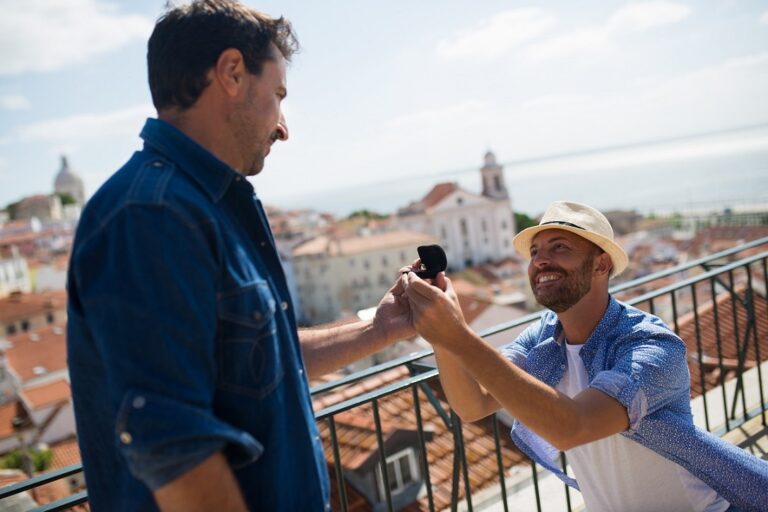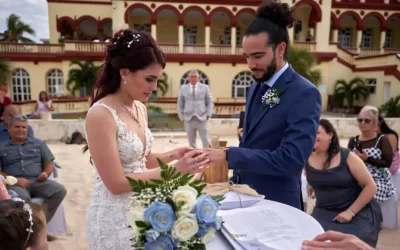Same-sex marriage in Cuba
Until 2019, the Cuban Constitution explicitly contained a prohibition on equal marriage. This restriction reflected a deeply conservative and traditionalist legal framework around the institution of marriage. The prohibition of marriage between people of the same sex was rooted in a heterosexual and normative vision of marriage, which did not recognize the diversity of sexual and emotional orientations present in Cuban society.
The historical and social context that led to the inclusion of this prohibition in the Constitution is complex. For decades, the LGBTQ+ community in Cuba faced a series of legal and social challenges. The Cuban Revolution of 1959 brought significant changes in many areas of Cuban life, but attitudes toward homosexuality remained largely conservative. The following decades saw a series of policies and practices that marginalized and discriminated against LGBTQ+ people, limiting their rights and visibility.

The voices of LGBTQ+ activists and organizations in Cuba have played a crucial role in the fight for the recognition of equal marriage. Through years of advocacy and visibility, these groups managed to put on the public agenda the need to reform laws and move towards a more inclusive society that respects human rights. This historical and social context is fundamental to understanding the meaning of the historic legal change that took place in 2019, when Cuba took a significant step towards recognizing the rights of LGBTQ+ people.
If you choose any of our packages, we offer you free consulting for legal and notarial services. Follow the links.
- Wedding Packages in Havana
- Wedding Packages at the Hotel Nacional de Cuba
- Wedding Packages at the Meliá Cohíba Hotel
- Wedding Packages at the Meliá Habana Hotel
- Wedding Packages in Varadero
The New Family Code: Legalization of Same-Sex Marriage in 2022
In September 2022, Cuba marked a milestone in the history of civil rights by legalizing equal marriage through the approval of the new Family Code. This significant change was the result of a meticulous process that involved extensive discussions and the active participation of various stakeholders in Cuban society. The National Assembly of People’s Power played a crucial role in the formulation of the new code, holding multiple sessions of debate and consultation.
The path towards the legalization of gay marriage in Cuba began long before the approval of the code. Various social movements and human rights organizations advocated for years for the inclusion of equal rights in the country’s legal framework. Growing social pressure and the need to align with international human rights standards motivated authorities to seriously consider reform.

The debates that preceded the approval of the code were intense and multifaceted. Not only legal and technical aspects were discussed, but also the social, cultural and ethical implications of equal marriage. Although there was resistance from certain conservative sectors, support for the measure grew considerably, reflecting a change in attitudes towards diversity and inclusion.
Finally, on September 25, 2022, the referendum resulted in a majority in favor of the reform, leading to the official promulgation of the new Family Code. This historic event not only legalized same-sex marriage, but also reaffirmed Cuba’s commitment to the principles of equality and social justice.If you decide to celebrate your wedding with us, you will have access to legal and notarial consulting at no additional cost. You can get details about our services and the exclusive benefits we offer in the following packages:
- Wedding Packages at Starfish 4 Palmas Resort
- Wedding Packages at Paradisus Resort
- Wedding Packages at the Iberostar Tainos Resort
- Wedding Packages at the Meliá Jardines del Rey Cayo Coco Resort
Additional Provisions: Gay Adoption and Surrogacy
The new Family Code in Cuba, in addition to legalizing equal marriage, introduces significant provisions on gay adoption and surrogacy. These measures represent an important step towards the protection and recognition of the rights of diverse families in the country, aligning with global trends in human rights and social equity.
Regarding adoption by same-sex couples, the Family Code establishes that all people, regardless of their sexual orientation, have the right to form a family through adoption. This provision is essential to ensure that homosexual couples are treated equally with heterosexual couples. Before this reform, same-sex couples faced numerous legal and social barriers to adopting, which limited their opportunities to start a family. With the implementation of these new laws, it is expected that there will be an increase in the number of adoptions by homosexual couples, providing stable and loving homes for children in need.

The new provisions on gay adoption and surrogacy not only protect the rights of same-sex couples, but also recognize the diversity of contemporary family forms. By providing a clear and equitable legal framework, Cuba moves towards a more inclusive society that respects the rights of all people, regardless of their sexual orientation.
If you select any of the following offers, we provide you with free legal and notarial advice as an added value. Take advantage of this unique opportunity to receive professional assistance in your procedures! Visit these links:
- Wedding Packages at Hotel Inglés
- Wedding Packages at the Pullman Cayo Coco Resort
- Wedding Packages at the Iberostar Varadero Resort
Impact and Reactions: Cuban Society and Equal Marriage
The legalization of equal marriage in Cuba, through the new Family Code, has sparked a wide range of reactions both within the country and in the international community. This historic legal change has been received with enthusiasm by many sectors of Cuban society, who see in this measure a significant advance towards equal rights and inclusion of LGBTQ+ people. Various groups of activists and human rights defenders have celebrated the approval of gay marriage in Cuba, considering it a milestone in the fight for social justice.

At the international level, the legalization of equal marriage in Cuba has been observed with interest and, in many cases, with approval. International organizations and foreign governments have praised this measure as a positive step towards the recognition of human rights and gender equality. However, some observers have noted that effective implementation of this legislation will require continued efforts to overcome social and cultural barriers that remain.
In the long term, the legalization of same-sex marriage could have a profound impact on Cuban society. The visibility and acceptance of same-sex couples can contribute to greater understanding and tolerance, reducing discrimination and fostering a more inclusive environment. Furthermore, this legal change could strengthen LGBTQ+ rights on the island, offering a solid legal basis for the protection and recognition of these communities. Ultimately, the evolution of equal marriage in Cuba will be a continuous process, marked by dialogue and social adaptation.







